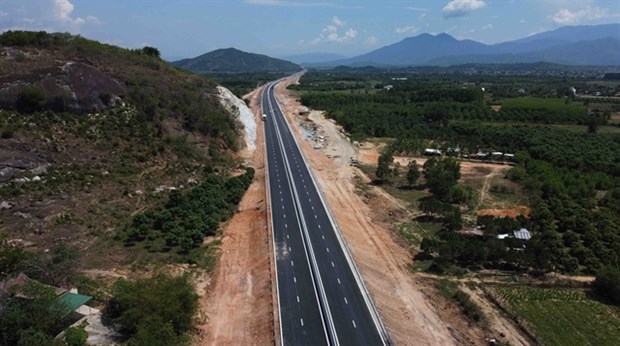566km of expressways completed in three years: transport ministry
About 566km of expressways have been constructed since 2020, increasing the total length of highways in the country to 1,729km, according to a recent report from the transport ministry.
 A section of Nha Trang-Cam Lam Expressway which was put into use in May 2023. (Photo: VNA)
A section of Nha Trang-Cam Lam Expressway which was put into use in May 2023. (Photo: VNA)Those statistics were compared to 1,163km of expressways completed between 2004 and 2019, showing that the expressway sections completed in the last three years equal half of those completed in the nearly 20 years earlier.
Transport Minister Nguyen Van Thang has sent a report to National Assembly (NA) deputies on issues he will be quizzed over this week at the NA question-and-answer session.
The report covers key transport projects completed since the beginning of the NA tenure.
According to the ministry, more than 1,000km of expressways are under construction.
Ring Road No 4 in Hanoi, Ring Road No 3 in HCM City and Khanh Hoa - Buon Ma Thuot, Bien Hoa - Vung Tau, Chau Doc - Can Tho - Soc Trang, Tuyen Quang - Ha Giang, and the Dong Dang - Tra Linh expressway are on the list of construction and waiting for approval.
Once those projects are finished, it is estimated that there will be an additional 344km of expressways nationwide.
It is expected that by 2025, Vietnam will have over 3,000km of expressways and by 2030 it will increase to 5,000km.
The report also highlights the upgrade of four key railway lines on the Hà Nội-HCM City route, helping shorten travel time and enhancing safety.
The ministry set the target of investing in high-speed North-South railway line.
The Ministry of Transport has completed upgrading and renovating 22 airports, including upgrading runways, taxiways, and terminals at Noi Bai and Tan Son Nhat international airports as well as started construction of Long Thành International Airport (phase 1), and Terminal T3 of Tan Son Nhat International Airport.
The synchronous and modern traffic infrastructure has contributed to reducing traffic accidents and congestion in big cities, according to the assessment of the Ministry of Transport.
Minister Thang said traffic congestion had been reduced in big cities, citing an example at Build-Operate-Transfer toll booths where non-stop fee collection systems are operated.
Thanks to the non-stop fee collection systems, congestion at toll booths had been addressed, he said.
According to the Ministry of Transport, the solution to the traffic congestion problem is to strictly apply the regulation in which land for traffic accounts for 16-26% of the urban construction area. Another solution is to relocate universities, hospitals and industrial parks out of the inner city./.













